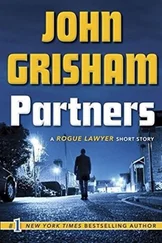John Grisham - Chamber
Здесь есть возможность читать онлайн «John Grisham - Chamber» весь текст электронной книги совершенно бесплатно (целиком полную версию без сокращений). В некоторых случаях можно слушать аудио, скачать через торрент в формате fb2 и присутствует краткое содержание. Жанр: Триллер, на английском языке. Описание произведения, (предисловие) а так же отзывы посетителей доступны на портале библиотеки ЛибКат.
- Название:Chamber
- Автор:
- Жанр:
- Год:неизвестен
- ISBN:нет данных
- Рейтинг книги:4 / 5. Голосов: 1
-
Избранное:Добавить в избранное
- Отзывы:
-
Ваша оценка:
- 80
- 1
- 2
- 3
- 4
- 5
Chamber: краткое содержание, описание и аннотация
Предлагаем к чтению аннотацию, описание, краткое содержание или предисловие (зависит от того, что написал сам автор книги «Chamber»). Если вы не нашли необходимую информацию о книге — напишите в комментариях, мы постараемся отыскать её.
Chamber — читать онлайн бесплатно полную книгу (весь текст) целиком
Ниже представлен текст книги, разбитый по страницам. Система сохранения места последней прочитанной страницы, позволяет с удобством читать онлайн бесплатно книгу «Chamber», без необходимости каждый раз заново искать на чём Вы остановились. Поставьте закладку, и сможете в любой момент перейти на страницу, на которой закончили чтение.
Интервал:
Закладка:
"Of course. And you did all this study and research in your garage?"
"That's what I said."
"Your own little laboratory."
"Call it whatever you want."
"Well, the FBI conducted a thorough search of your house, garage, and premises while you were in custody. They didn't find a trace of evidence of explosives."
"Maybe they're stupid. Maybe I was real careful and didn't leave a trail."
"Or maybe the bomb was planted by someone with experience in explosives."
"Nope. Sorry."
"How long did you stay in the coffee shop in Greenville?"
"A helluva long time. Five o'clock came and went. Then it was almost six. I left a few minutes before six and drove by Kramer's office. The place looked fine. Some of the early risers were out and about, and I didn't want to be seen. I crossed the river and drove to Lake Village, Arkansas, then returned to Greenville. It was seven by then, sun was up and people were moving around. No explosion. I parked the car on a side street, and walked around for a while. The damned thing wouldn't go off. I couldn't go in after it, you know. I walked and walked, listening hard, hoping the ground would shake. Nothing happened."
"Did you see Marvin Kramer and his sons go into the building?"
"No. I turned a corner and saw his car parked, and I thought dammit! I went blank. I couldn't think. But then I thought, what the hell, he's just a Jew and he's done many evil things. Then, I thought about secretaries and other people who might work in there, so I walked around the block again. I remember looking at my watch when it was twenty minutes before eight, and I had this thought that maybe I should make an anonymous phone call to the office and tell Kramer that there was a bomb in the closet. And if he didn't believe me, then he could go look at it, then he could haul ass."
"Why didn't you?"
"I didn't have a dime. I'd left all my change as a tip for the waitress, and I didn't want to walk into a store and ask for change. I have to tell you I was real nervous. My hands were shaking, and I didn't want to act suspicious in front of anybody. I was a stranger, right? That was my bomb in there, right? I was in a small town where everybody knows everyone, and they damned sure remember strangers when there's a crime. I remember walking down the sidewalk, just across the street from Kramer's, and in front of a barbershop there was a newspaper rack, and this man was fumbling in his pocket for change. I almost asked him for a dime so I could make a quick call, but I was too nervous."
"Why were you nervous, Sam? You just said you didn't care if Kramer got hurt. This was your sixth bombing, right?"
"Yeah, but the others were easy. Light the fuse, hit the door, and wait a few minutes. I kept thinking about that cute little secretary in Kramer's office, the one who'd shown me to the rest room. The same one who later testified at trial. And I kept thinking about the other people who worked in his office because when I went in that day I saw people everywhere. It was almost eight o'clock, and I knew the place opened in a few minutes. I knew a lot of people were about to get killed. My mind stopped working. I remember standing beside a phone booth a block away, staring at my watch, then staring at the phone, telling myself that I had to make the call. I finally stepped inside and looked up the number, but by the time I closed the book I'd forgotten it. So I looked it up again, and I started to dial when I remembered I didn't have a dime. So I made up my mind to go into the barbershop to get some change. My legs were heavy and I was sweatin' like hell. I walked to the barbershop, and I stopped at the plate glass window and looked in. It was packed. They were lined up against the wall, talking and reading papers, and there was a row of chairs, all filled with men talking at the same time. I remember a couple of them looked at me, then one or two more began to stare, so I walked away."
"Where did you go?"
"I'm not sure. There was an office next door to Kramer's, and I remember seeing a car park in front of it. I thought maybe it was a secretary or someone about to go into Kramer's, and I think I was walking toward the car when the bomb went off."
"So you were across the street?"
"I think so. I remember rocking on my hands and knees in the street as glass and debris fell all around me. But I don't remember much after that."
There was a slight knock on the door from the outside, then Sergeant Packer appeared with a large Styrofoam cup, a paper napkin, a stir stick, and creamer. "Thought you might need a little coffee. Sorry to butt in." He placed the cup and accessories on the counter.
"Thanks," Adam said.
Packer quickly turned and headed for the door.
"I'll take two sugars, one cream," Sam said from the other side.
"Yes sir," Packer snapped without slowing. He was gone.
"Good service around here," Adam said.
"Wonderful, just wonderful."
14
Sam, of course, was not served coffee. He knew this immediately, but Adam did not. And so after waiting a few minutes, Sam said, "Drink it." He himself lit another cigarette, and paced around a bit behind his chair while Adam stirred the sugar with the plastic stick. It was almost eleven, and Sam had missed his hour out, and he had no confidence that Packer would find the time to make it up. He paced and squatted a few times, performed a half dozen deep bends, knees cracking and joints popping as he rose and sank unsteadily. During the first few months of his first year on the Row, he had grown quite disciplined with his exercise. At one point, he was doing a hundred push-ups and a hundred sit-ups in his cell each day, every day. His weight fell to a perfect one hundred and sixty pounds as the low-fat diet took its course. His stomach was flat and hard. He had never been so healthy.
Not long afterward, however, came the realization that the Row would be his final home, and that the state would one day kill him here. What's the benefit of good health and tight biceps when one is locked up twenty-three hours a day waiting to die? The exercise slowly stopped. The smoking intensified. Among his comrades, Sam was considered a lucky man, primarily because he had outside money. A younger brother, Donnie, lived in North Carolina and once a month shipped to Sam a cardboard box packed neatly with ten cartons of Montclair cigarettes. Sam averaged between three and four packs a day. He wanted to kill himself before the state got around to it. And he preferred to go by way of some protracted illness or affliction, some disease that would require expensive treatment which the State of Mississippi would be constitutionally bound to provide.
It looked as though he would lose the race.
The federal judge who had assumed control of Parchman through a prisoners' rights suit had issued sweeping orders overhauling fundamental correction procedures. He had carefully defined the rights of prisoners. And he had set forth minor details, such as the square footage of each cell on the Row and the amount of money each inmate could possess. Twenty dollars was the maximum. It was referred to as `dust', and it always came from the outside. Death row inmates were not allowed to work and earn money. The lucky ones received a few dollars a month from relatives and friends. They could spend it in a canteen located in the middle of MSU. Soft drinks were known as `bottle-ups'. Candy and snacks were `zu-zus' and `wham-whams'. Real cigarettes in packages were `tight-legs' and `ready-rolls'.
The majority of the inmates received nothing from the outside. They traded, swapped, and bartered, and gathered enough coins to purchase loose leaf tobacco which they rolled into thin papers and smoked slowly. Sam was indeed a lucky man.
He took his seat and lit another one.
Читать дальшеИнтервал:
Закладка:
Похожие книги на «Chamber»
Представляем Вашему вниманию похожие книги на «Chamber» списком для выбора. Мы отобрали схожую по названию и смыслу литературу в надежде предоставить читателям больше вариантов отыскать новые, интересные, ещё непрочитанные произведения.
Обсуждение, отзывы о книге «Chamber» и просто собственные мнения читателей. Оставьте ваши комментарии, напишите, что Вы думаете о произведении, его смысле или главных героях. Укажите что конкретно понравилось, а что нет, и почему Вы так считаете.











